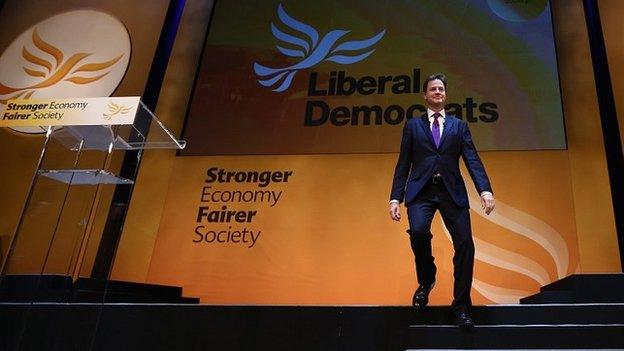Clegg's message: We can handle government so give us another go
- Published

Nick Clegg took 6000 words to say it. But the message of his conference speech was clear and it can be boiled down to this:
People said coalition would be rubbish. We have proved them wrong. Lib Dems can handle government. We are fixing the economy. Give us another go to finish the job. We can work with either the Tories or Labour - the choice is up to voters. Lib Dems in coalition would keep either party on the straight and narrow. Coalition is better than one party government.
On one level, this is a traditional electoral pitch, urging voters to stick to what they know and what they have got. Do not risk it all by voting for the other team.
But on another level it is quite a radical message, an argument that the last three years of coalition should not just be an historical aberration but a permanent fixture.
He talks of "bringing down the two party system" and ending what he calls the "clapped-out politics of red and blue".
Bold pitch
In itself, this is a bold pitch, an argument for an end to one-party government.
Some voters might ask if they had been so wrong to vote for Margaret Thatcher in 1979, or Tony Blair in 1997, and whether coalition is always the right solution for the country in all circumstances.
But this part of Mr Clegg's speech was not just directed at voters, it was also directed at his party.
It was a tacit acknowledgement that there are some Lib Dems who still feel the last few years of coalition may perhaps have been necessary but were by no means desirable, and should not be repeated.

Are big majorities - like Tony Blair's in 1997 - a thing of the past?
Mr Clegg is saying to them that this is wrong, that Lib Dems should not just be proud of their time in government but that they should want more.
As one aide said, they should be "excited" about another term in office. In many ways, Mr Clegg is pitching himself as the Al Jolson of British politics, almost declaring "you ain't heard nothing yet." (His actual phrase was "we ain't done yet.")
One potential difficulty with this strategy is that people cannot vote for coalition, they can vote only for parties. The prospects of another coalition will not be determined just by how many people vote for the Lib Dems.
Political promiscuity
And the risk is that the idea of the Lib Dems becoming a permanent party of government could lead to accusations of political promiscuity, a party willing to compromise its policies in any political direction simply to remain in power.
So it was in part to address this point that Nick Clegg delivered long lists not just of what the Lib Dems had achieved in government - from the pupil premium to gay marriage - but also what they had stopped the Tories from doing - such as inheritance tax cuts and the so-called snoopers' charter.
And it was also why he spoke at length about his family, the values of his late father-in-law who was mayor of a small village in Spain, and his own eclectic multi-national up-bringing. It might seem odd for Mr Clegg to feel the need to re-introduce himself to the British people after three years in government.
Some might conclude that it might reflect his own poor personal standing in the opinion polls. But in truth it is a tacit acknowledgement by the leadership that some voters still distrust the Lib Dems and what they might get up to in another term of office.
Hence the language about the party's values. The message is: trust us, despite the compromises we have had to make in office.
Perhaps the standout phrase in the speech, though, is this: "I know I won't be in politics forever," followed a few sentences later by: "I'm forever looking for ways to try to get out of Whitehall."
This, we are told, is not a premature resignation statement. His aim is to try to persuade people that he has not sold out to the establishment, that he and his party are still the outsiders of British politics.
The risk is that voters interpret this as a threat: if you don't vote me back, I am off. To Nick Clegg's critics, that might be an enticing thought.